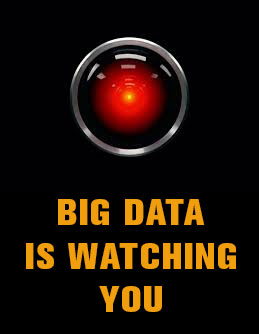Monitoring and power
Critics like Radke, Kietzmann and Angell worry that many of the technologies that we consider to be simple conveniences or safeguarding tools could be promoting a culture of surveillance and dataveillance that is ultimately oppressive: dangerous to our freedom and civil liberties - or at least those of some of us. Every time we use a debit card, credit card, or reward card the information is recorded and these can be tracked and analyzed. Our phones have become a part of us, most of us are never without them, but their cameras and GPS systems have the capacity to operate as tracking and monitoring devices that could at least potentially be accessed without our knowledge or approval - or more likely (and this is important) actually with our knowledge and approval.
Private capitalist ventures such as Google or Facebook monitor our interaction with them in order to more effectively deliver advertising (and other content) to us, but what else might they start delivering to us based on the profiles they tease out of our online activity? Clearly they have sometimes been sending us targeted paid-for political messages based on our browsing histories, for instance. There are worries about the use of our digital profiles to provide such "personalized propaganda" of various kinds. (This is separate from our opting in to personalized content, which leads to an increase in our self-confinement to "filter bubbles" where we are comfortable.)
The information that corporations gather is there potentially to be shared with repressive government agencies or other powermongers; it can be sold to companies we've made no deal with, and so forth. In Canada, there are laws to limit how and when our data can be shared with government agencies, and the sharing with other companies we have of course opted into when we clicked the Accept button. But perhaps we should be better protected - from government agencies, corporations, and ourselves. We'll come back to this question in the next lesson, on Democracy. Digital privacy is becoming a hotly debated topic with new legislation being discussed regularly. Rather than providing outdated links to specific news articles here, I'll just ask you to Google "digital privacy" and "parliament" or "Canada" (or the country of your choice) to learn more.

Former general counsel at the CIA Jeffrey Smith has claimed that "[g]enerally, as the IT community matured in this country [the United States], a number of things happened. They all opened Washington offices and they came to an understanding, after some initial arrogance, that they needed to deal with the government" (Hirsh). In Canada as in the U.S., where there are similar relationships between government and private corporations, most of us have an uneasy and ambivalent opinion of the monitoring that occurs. I would caution Canadians against paranoia in this regard. We live in a democracy with fairly strong civil rights, including privacy rights. When it comes to dataveillance, it is perhaps less the government one should be worried about, than hackers, who have breached security and stolen data in a number of high-profile incidents. I would worry about the companies themselves, though. Corporate power definitely rivals government power in democratic countries. But I try not to be too paranoid.
Canadians generally seem to be happier about surveillance than they are about dataveillance. On the one hand, a majority of Canadians polled at the beginning of the noughties felt that a lack of sufficient surveillance (cameras in the public space, for example) makes us at greater risk of terrorist attacks, for instance. On the other hand, a majority of Canadians is also opposed to having their private phone calls, emails, and texts monitored, not surprisingly (Gohier). In other words, a majority support "old school" physical surveillance in public, and a majority are more ambivalent toward or against dataveillance, which tracks things that traditionally would have been private, such as purchases, communications with friends and families, and what we read and watch.
This ambivalence is understandable. If Foucault is correct, and knowledge and power are intertwined to the degree that they are almost inseparable, and if surveillance produces and reinforces knowledge, then as we allow ourselves to be monitored we are granting a tremendous amount of "power-knowledge" - as Foucault would say - to companies, agencies, organizations, and potentially a totalitarian government. Those who run these powerful institutions often take pains to limit the amount of oversight and transparency to which they themselves are subjected. For evidence of this, we need look no further than the well-known stories about Wikileaks founder Julian Assange, or NSA whistleblower Edward Snowden (both of whom used modern digital technology against powerful groups, in essence turning the gaze back around). We might still get the world of 1984 if the balance of knowledge tilts ever more heavily in favour of the small elite groups in power. But is that really what's happening? Not necessarily, at least not yet. Things are more complicated and there are various forms of veillance interacting in our technologically rich world. Not all of them are run by "the government."